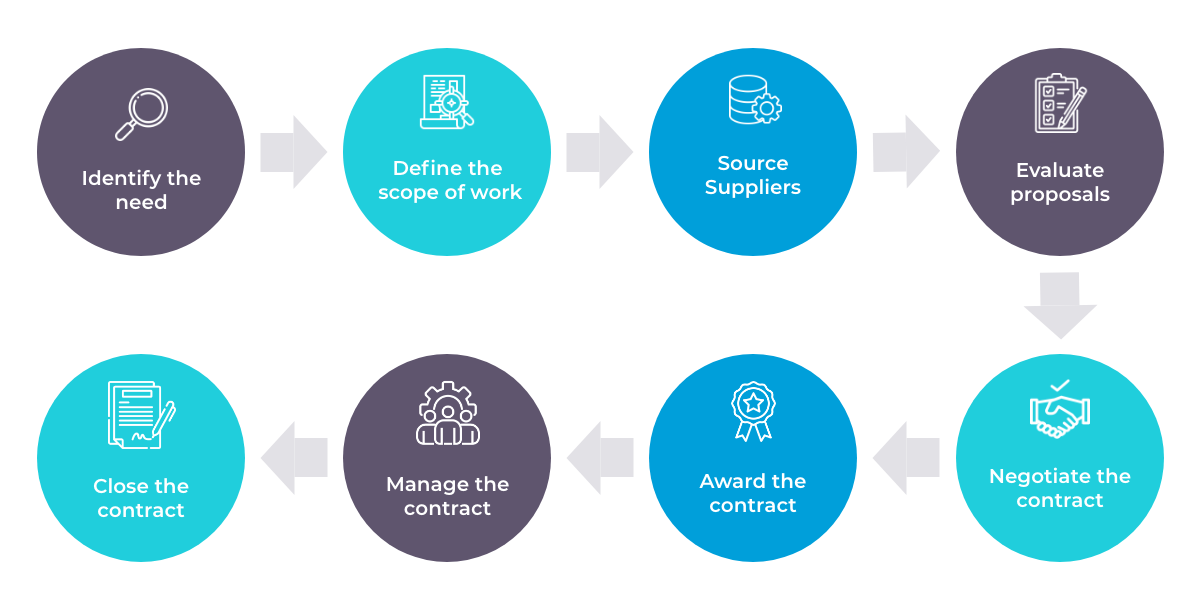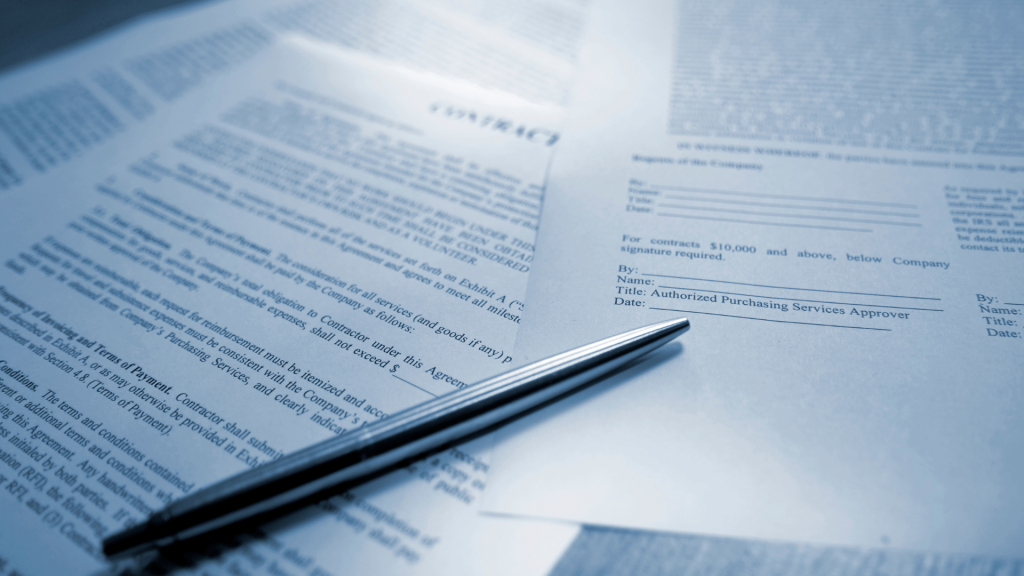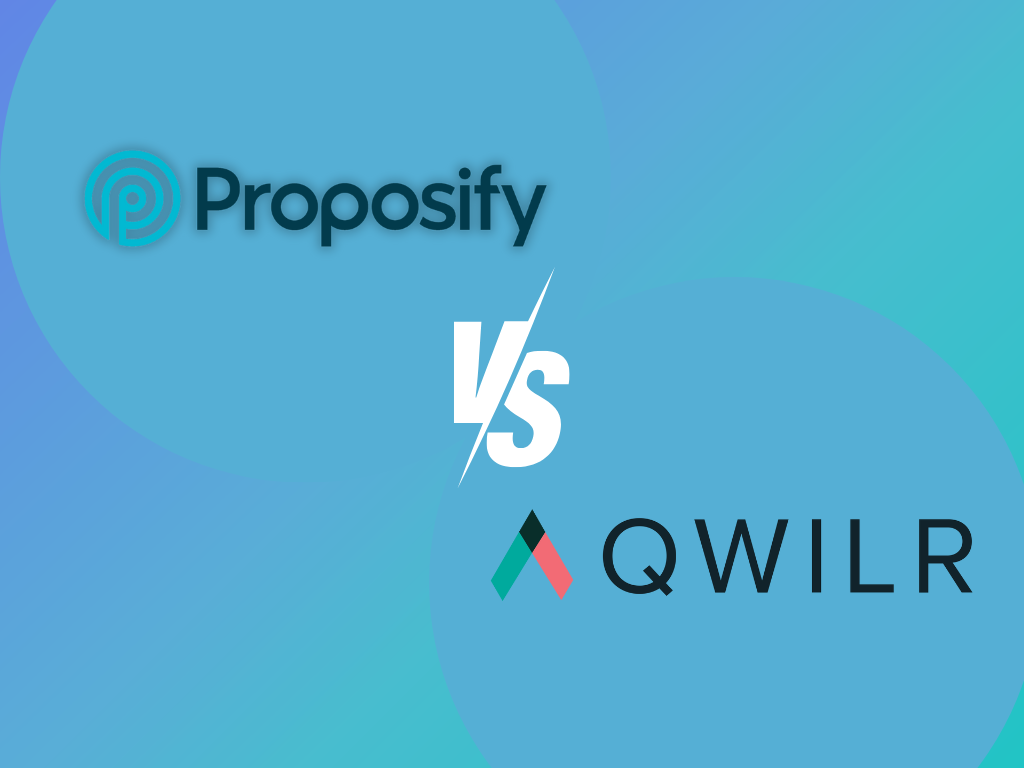Optimizing your organization’s procurement process is essential to ensure your business’s competitive advantage. One of the key parts of this process is contract management.
With contract management for procurement, you can develop and maintain strong relationships with suppliers and acquire quality materials at reasonable prices. It ensures that agreements are executed effectively and in compliance with established policies and procedures.
In this topic, we will explore the role of contract management in procurement and discuss how it can benefit your organization.
Table of Contents
What is Procurement Contract Management?

Procurement refers to the process of acquiring goods or services from external suppliers. It typically involves:
- identifying the goods or services that a business needs
- evaluating potential suppliers
- negotiating prices and terms
- managing the delivery and payment process
It can also involve managing relationships with suppliers and ensuring that they meet the business’s quality and performance standards. Having a contract that defines what both the buyer and seller are responsible for is important for managing vendor agreements. Effectively managing procurement contracts is essential for organizations looking to stay competitive.
Procurement contract management is what you need to ensure that vendor agreements align with the organization’s goals and objectives. It is overseeing and administering agreements between a buyer and a seller in the procurement process.
Contract management in procurement involves:
- Developing agreements between suppliers, vendors, manufacturers, and customers
- Maintaining and monitoring documents for purchasing materials, goods, and services.
- Managing the entire lifecycle of the contract, from negotiation and signing the agreement to the completion of the transaction.
The Procurement Contract Management Process
The procurement contract management process involves a series of steps that an organization follows to ensure that it obtains the goods and services it needs in a cost-effective and timely manner. Here is an overview of the steps in the procurement contract management process:

- Identify the need: The first step in procurement is identifying the need for a particular good or service. A specific project or initiative, such as a routine purchase, may trigger this.
- Define the scope of work: Once you have identified the need, the organization will define the scope of work for the procurement. This includes determining the specific goods or services needed and any particular requirements or specifications.
- Source suppliers: The organization will identify potential suppliers to provide the needed goods or services. This may involve conducting research, soliciting proposals, or issuing a request for proposal (RFP).
- Evaluate proposals: Once the organization has received proposals from potential suppliers, it will evaluate each proposal to determine which one offers the best value for money. This may involve comparing prices, reviewing the supplier’s track record, and assessing the quality of the goods or services provided.
- Negotiate the contract: If the organization decides to proceed with a particular supplier, it will negotiate the contract terms with that supplier. This may include the price, delivery schedule, and other terms and conditions.
- Award the contract: Once the agreement has been negotiated and finalized, the organization will award the contract to the selected supplier.
- Manage the contract: After the awarding, the organization will manage it to ensure that the supplier is meeting its obligations under the terms of the agreement. This may involve monitoring the supplier’s performance, addressing any issues, and ensuring that payments are made on time.
- Close the contract: When the goods or services have been received, the organization will close the deal and finalize any remaining payments or other administrative tasks.
Importance of Contract Management in Procurement
Proper contract management can help organizations:
Optimize contract lifecycles
Contract management enables contract managers to quickly and accurately draft contracts, track contract performance, and modify or renew contracts as needed. This can significantly reduce contract turnaround times and lifecycles, saving time and resources.
Negotiate better terms
Having visibility into contract terms helps contract managers negotiate better terms, such as pricing or contract periods. If terms are mutually beneficial, it increases the chances of compliance and improvements in contract performance. It assures managers that they provide the most value to help optimize supplier relationships.
Manage contract risks
Contract management helps identify and mitigate contract risks, such as delays, cost overruns, or disputes. Parties can better define and manage contract risks with visibility into contract performance.
Strengthen supplier relationships
Businesses can develop and maintain strong supplier relationships through contract management. Procurement managers can track agreement expirations, performance metrics, and other essential elements to strengthen supplier relationships and identify areas for improvement.
Stay compliant with all regulations
Laws such as GDPR require contract managers to ensure compliance. Contract management helps to ensure that organizations comply with their contracts’ terms and conditions, which is essential for legal and regulatory reasons.
Challenges in Procurement Management
Since the contract management process in procurement is quite complex, it’s not surprising that it comes with its own set of issues. Here are some of the most common: :
Lack of internal communication
The lack of internal communication significantly impacts procurement teams. Limited access to information makes it challenging to make effective decisions or collaborate with other departments. For procurement teams to provide the best value across departments, centralizing processes can increase collaboration and expedite decision-making between departments.
Procurement bypass
Procurement bypass involves circumnavigating established processes and procedures to make a purchase. This can occur for various reasons, such as the desire for a quick purchase without following the steps. It also stems from the belief that the process is burdensome or lacks understanding of the importance of following procedures.
Difficulty tracking contracts
Suppose the information is not centralized, or contract tracking systems are not used. In that case, monitoring contract performance or identifying obligations could be challenging. Without proper contract management, managers may not have visibility into the terms of their supplier contracts. This can lead to uncertainty and a lack of trust in the supplier relationship.
Inaccuracies in supplier contract data
A contract is often extended or amended over time, causing a scattering of data across different systems and departments. Manually managing them makes you vulnerable to inconsistencies and errors. It results in overlooked critical information like scheduled price increases or compliance issues. This has driven the need for technology-driven solutions that simplify contract management.
Slow contract cycle
It’s not uncommon for contract processes to stretch for months, stalling the entire process and delaying access to goods and services. For example, the back-and-forth between contract lawyers, legal teams, and procurement departments can prolong the cycle. To optimize contract cycles, organizations are leveraging digital solutions such as eSignatures that significantly reduce contract turnaround times.
Poor supplier relationship management
Building good relationships with suppliers is essential for contract performance. For instance, contract terms that are too stringent can decrease the supplier’s motivation to perform. On the other hand, contract terms that are too lenient can lead to contract breaches or non-payment. Contract managers need to handle renewals proactively and without delay, as this affects the contract timeline and compliance.
Best Practices for Procurement Contract Management

Now that you know the importance and challenges of contract management in procurement, here are some best practices you can use to improve contract management for your organization:
1. Automate processes
Remove the need for manual ordering and purchase processes, and focus on more strategic tasks. Technology-driven solutions can help managers automate and accurately draft contracts, monitor performance, and track compliance. Solutions like eSignatures can also help reduce turnaround times and improve visibility.
2. Utilize contract templates
Using contract templates ensures managers can quickly access the information they need without starting from scratch. It also helps contract managers save time and resources while ensuring contract accuracy.
3. Monitor expenses
Managers should monitor contract expenses and track supplier performance to ensure contract compliance and optimize contract terms. Additionally, managers can use analytics to identify areas for improvement.
4. Develop strong relationships with suppliers
Strong supplier relationships are essential for contract compliance and optimization. Vendor management solutions like contract management software can help contract managers build trust and maintain strong relationships with their suppliers.
How Fill Can Help With Procurement Contracts
Fill is the all-in-one solution if you’re looking to improve your organization’s contract management for procurement. It makes contract drafting, tracking, and managing easier. This feature-rich app addresses all the challenges contract managers face.
With Fill, you can:
- Streamline procurement processes. Our software enables the automation of contract management that speeds up the purchasing process. It guarantees shorter lead times, resulting in improved operational efficiency.
- Request signatures efficiently. Our system enables users to request eSignatures from any device. You can even ask multiple signatories to sign the same contract simultaneously.
- Analyze contract performance. Our robust analytics features enable contract managers to track contract performance and identify areas for improvement.
- Create a centralized digital repository. When all agreements are part of a centralized system, you can securely access any details whenever needed.
- Comply with federal laws and industry regulations. Our contract management system allows you to maintain contract compliance with the most recent laws, such as GDPR, HIPAA, GLBA, E-Sign Act, and UETA.
- Minimize fraud and contract risks. Our software can help contract managers identify potential fraud and contract risks with our signer authentication features.
- Receive instant alerts and notifications. Fill sends contract-related alerts and notifications for rapid response and to avoid missed deadlines.
Simplify contract management for procurement with Fill and take advantage of all its tools to streamline processes. Schedule a free demo now.




